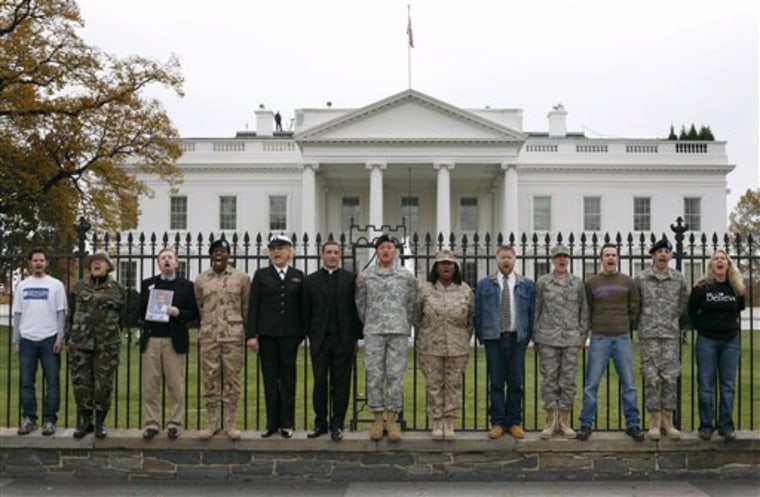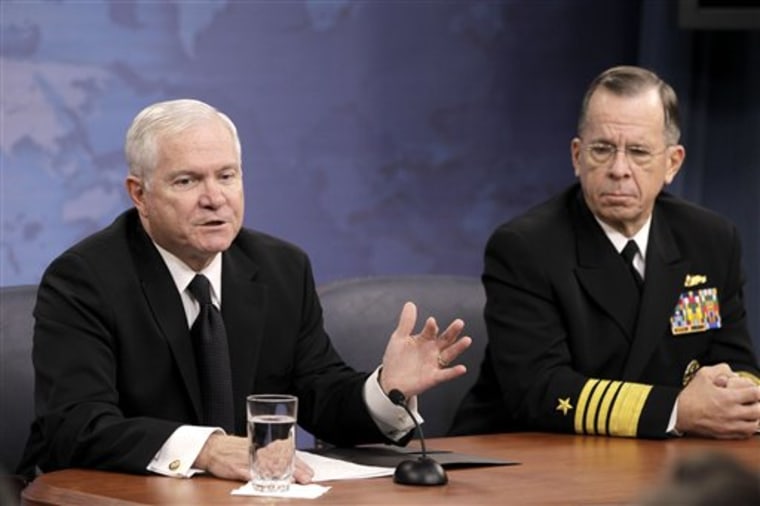A Pentagon study on gays in the military has determined that overturning the law known as "don't ask, don't tell" might cause some disruption at first but would not create any widespread or long-lasting problems.
The study provided ammunition to congressional Democrats struggling to overturn the law. Even with the release of Tuesday's study, however, there was no indication they could overcome fierce Republican objections with just a few weeks left in the year-ending session of Congress. Democrats will be in the minority when Congress reconvenes in early January.
"We are both convinced that our military can do this, even during this time of war," wrote the study co-chairs Pentagon General Counsel Jeh Johnson and Army Gen. Carter Ham.
Defense Secretary Robert Gates and the chairman of the Joint Chiefs of Staff, Adm. Mike Mullen, said Congress should act quickly because of a recent effort by a federal judge to overturn the law.
Gates said the military needs time to prepare for such a change, even though he said he did not envision any changes to personnel policy that would be needed. He said a sudden court-issued mandate would significantly increase the risk of causing disruption to the force.
"Given the present circumstances, those that choose not to act legislatively are rolling the dice that this policy will not be abruptly overturned by the courts," Gates told reporters.
Findings: Two-thirds don't care if ban is lifted
Overall, the survey found that some two-thirds of troops do not care if the ban is lifted. Of the 30 percent who objected, most were on duty in combat areas.
Opposition was strongest among combat troops, with at least 40 percent saying it was a bad idea. That number climbs to 58 percent among Marines serving in combat roles.
A summary of the report says 69 percent of respondents believe they already have served alongside a gay person, of which 92 percent said their unit was able to work together and 8 percent said the unit functioned poorly as a result.
"We have a gay guy. He's big, he's mean and he kills lots of bad guys. No one cared that he was gay," the report quotes a member of the special operations force as saying.
The report predicts that many gay troops would be likely to keep their sexual orientation quiet even after the ban is lifted. That discretion probably would be even more common in the military than in the civilian world, in which some but not all gay people choose to reveal their orientation at work, the reports authors said.

Of those who said they are gay, only 15 percent said they would want that known to everyone in their unit.
The summary included anonymous quotes from gay troops currently serving.
"I will just be me," one person said. "I will bring my family to family events. I will put family pictures on my desk. I am not going to go up to people and say, 'Hi there. I'm gay.'"
Existing policies could stay in place
Gates said he didn't think the Pentagon would have to rewrite its regulations on housing, benefits or fraternization to accommodate gays if they were allowed to serve openly.
"Existing policies can and should be applied equally to homosexuals as well as heterosexuals," he said, adding that the change could be addressed through increased training and education.
Though some troops suggested during the study that there should be separate bath and living facilities for gays, the report recommended against it because it would be a "logistical nightmare, expensive and impossible to administer."
Further, separate facilities would stigmatize gays and lesbians in the way that "separate but equal" facilities did to blacks before the 1960s, it said.
The report said commanders could address individual problems on a case-by-case basis.
The survey is based on responses by some 115,000 troops and 44,200 military spouses to more than a half million questionnaires distributed last summer by an independent polling firm.
The House already has voted to overturn the law as part of a broader defense policy bill. But Senate Republicans have blocked the measure because they say not enough time has been allowed for debate on unrelated provisions in the bill.
Senate Majority Leader Harry Reid, a Democrat, has promised a vote on the matter by the end of the year, after hearings are held this week on the Pentagon study. Still, some gay rights groups have complained that Democratic leaders have done little to push for repeal before the new Congress takes over in January.
Reid spokesman Jim Manley said the majority leader is "very much committed to doing away with the ban this year" but that it was the Republicans' fault for blocking the bill.
